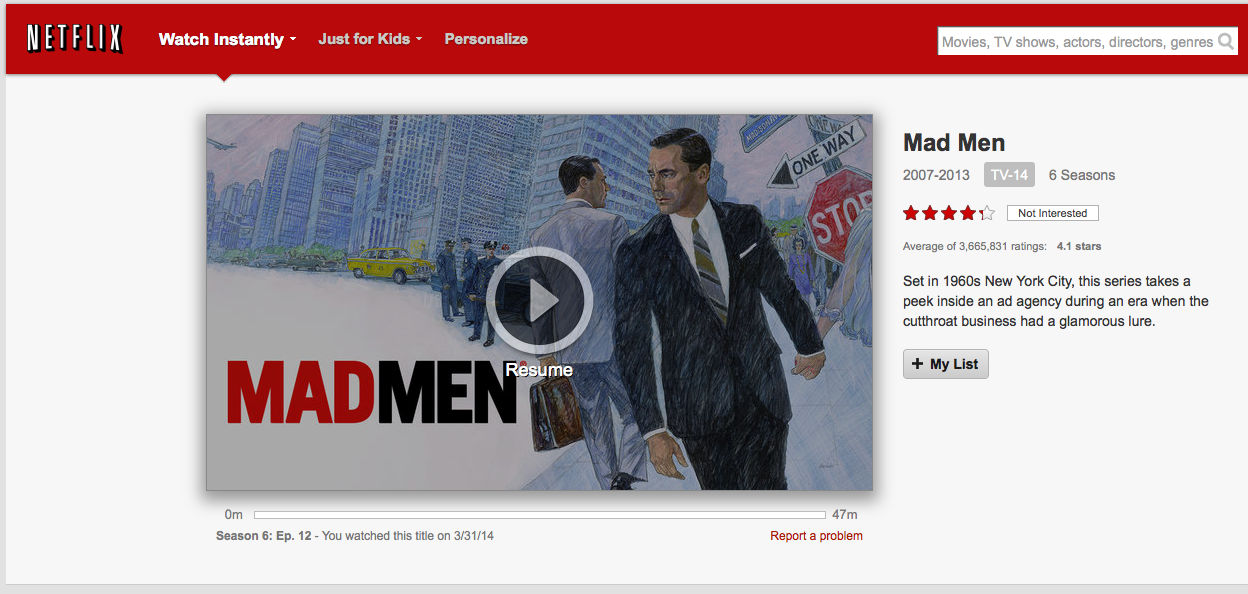Matthew Weiner is quite the perfectionist when it comes to period detail accuracy. It has been said that personalized notepads have been made for most ad men/women at the firm, tucked away in drawers that may never be opened. A team of experts make sure the props, historical data, and references are all perfectly correct. It has been said that Weiner even makes cast members wear period-appropriate undergarments.
But hey, we all slip. Here are the times audience members freakishly looked into the details of Mad Men, and won:
In the very first episode of the very first season, Don Draper tells Pete Campbell, "I had a report just like that, and it's not like there's some magic machine that makes identical copies of things." Hm...there actually was.
The first photocopier was released by Xerox in 1959, and would have been well-known, especially by someone like Don Draper. But I would let it slide, it was definitely a rookie move.

When it is discovered that Betty in fact has the mind of a child, in Season 1, episode 4, "The Ladies Room," she tells the psychiatrist that her neighbor had a jealous attitude that brought her back to
sorority days. The only problem is, Betty attended Bryn Mawr, which has no sororities.

Marshall McLuhan's famous phrase,
"The medium is the message" became popularized in his 1964
Understanding Media: The Extensions of Man. Joan quotes the media theorist in Season one, episode six, "Babylon," when letting Peggy know (coldly, duh) that she has received a promotion, where she gets more responsibility but equal pay. She says, "Well you know what they say, the medium is the message." Peggy shouldn't "know what they say," as it is only 1960.
Ken Cosgrove asks Jane to a Mets game at
Shea Stadium in Season 2, episode 7, "The Gold Violin." The
episode was set in 1962 and
Shea Stadium didn't open til 1964. He should have asked her to a game at the Polo Grounds, where the Mets were playing at the time.
 |
| The grand opening of Shea Stadium on April 17th, 1964 |
No Dylan on the radio. In Season 2, episode 11, "The Jet Set," Peggy says that she heard Bob Dylan on the radio. The episode is set in 1962, when Dylan hadn't produced any singles, just after his
ill-fated debut album that most likely hadn't made it to radio.
In Season 3, episode 2, "Love Among the Ruins," it is clear that Lane Pryce has a three-volume Compact Edition of the Oxford English Dictionary. The OED has been around since the 1800s, but this specific edition wasn't printed until 1987.
In Season 3, episode 3, "My Old Kentucky Home," you may remember Roger Sterling's blackface performance. The drummer was using a crash cymbal that wasn't available until the seventies.
Don is shown watching a nighttime NFL game on TV in Season 4, episode 1, "Public Relations."
Prime-time football didn't actually begin until 1970, and the episode is set in 1964.
In Season 6, episode 4, "To Have and to Hold," Joan references having dinner at Le Cirque. The New York City restaurant opened in 1974, but this specific episode takes place in 1968.
This, as Weiner calls it "
terrible error," was actually heavily buzzed about. I guess what happened was, many
Mad Men fans also happened to be New York City restaurant buffs. Even so, Matthew Weiner doesn't sweat it, "I think the pleasure some people get from the mistake makes more entertainment for the show.”
Ok, now this one is quite ridiculous. Font designer Mark Simonson noticed that the sign on the Sterling Cooper building uses Gil Sans, but the font was not in popular use until the seventies.
As far as language goes, there are a lot of phrases that slip out of the writer's post-millennium minds into the scripts of the '60s. Characters have said things like "In a good place," "on the same page," "loose lips sink ships," and other phrases years before they were invented or popularized. Hey, who would have know that in the sixties most people used "ought to" instead of the more modern "need to." I guess the
Mad Men writers should have.
For the last and final season of Mad Men, I'm sure Weiner has his fact-checkers working overtime.


